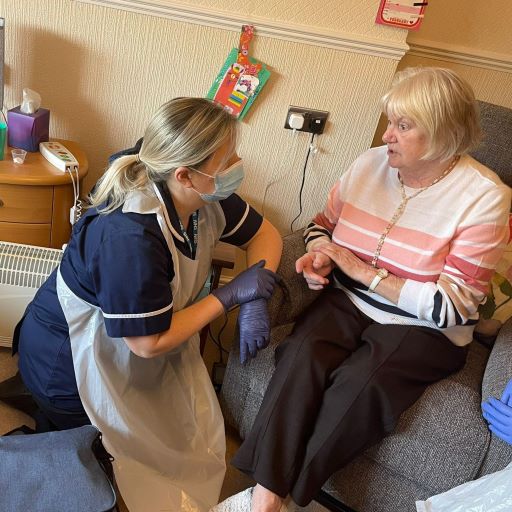Hospital at Home

About Hospital at Home
Hospital at Home provides an alternative option for those who are frail, elderly, or with acute respiratory infections who become unwell and would normally be spending time in hospital.
It helps prevent avoidable admission into hospital, supporting early discharge out of hospital, and increase the overall bed-base available for acute care.
We know from research and experience that keeping frail people in their familiar surroundings but with the necessary care and support from the hospital and community services, is likely to improve their outcome.
Having your care delivered via Hospital at Home means you spend a shorter amount of time in hospital, or avoid being admitted altogether. This reduces those risks known to be associated with in-hospital stays.
Once you are transferred to Hospital at Home we will arrange any diagnostic tests, necessary medication and equipment you may require and will co-ordinate the team responsible for your care at home.
You could be receiving care through Hospital at Home for up to 14 days, and once recovered you will be discharged back to the care of your GP with any community service support needed.
How does Hospital at Home work?
If you are admitted to Hospital at Home you will receive your care from a dedicated team of clinicians, nurses, therapists and social care professionals. This will be led by your consultant who will develop your individual care-plan.
This team of professionals will meet daily to discuss your care-plan and monitor your progress. Your care will be delievered in the most necessary way and your relevant family members/care service will be kept involved in order to ensure that your care-plan is adjusted to suit your changing needs.
How will I benefit from Hospital at Home?
Being admitted to Hospital at Home could help relieve some of the fear that some patients experience when coming to hospital, by trying to avoid hospital admission in the first instance and reducing the length of your hospital stay.
It should lead to a quicker recovery as you will be cared for in familiar surroundings with your family/carers around you, knowing that your needs are being supported via a collaborative team of health and care workers.
All of this should improve your experience and help you to stabilise and recover more quickly.
Which patients might benefit from Hospital at Home?
- Patients displaying mild delirium symptoms due to chest or urine infections
- Patients with symptoms or test results that need short term monitoring
- Patients with reduced mobility
- Patients who have fallen but not fractured any bones
- Patients with mild to severe heart failure
How you'll be referred and a Patient Information Leaflet on the service
You can be referred by:
- Your general practitioner or Advanced Nurse Practitioner
- Yorkshire Ambulance Service, 111 service
- Community Health teams including Social Care Specialist Nursing Team
- Acute Trust Clinicians
- Community Care beds
- Care-Homes via GP or Urgent Community Response team
However, it is a condition of referral that you have been seen face to face by the referrer to make sure your assessment is suitable for Hospital at Home.
You can download our patient information leaflet on our Patient Leaflet Repository.
Further information can be found on the NHS England website.
Contacting Hospital at Home
If you need to speak to someone about your treatment whilst receiving care and support from Hospital at Home, please call 07435 178 583.
This number is manned betweeen 8am and 6pm daily.
If you call outside of these times, please leave a message and the team will return your call as soon as possible the next working day.
Jean's story
Jean was cared for by Hospital at Home. She had been admitted to hospital four days earlier with a chest infection and needed a chest X-ray followed by intravenous antibiotics. Jean lives with her daughter and granddaughter at home.
After a couple of days, it became clear she needed a longer course of antibiotics and would need to stay in hospital but already felt better and wanted to go home. Instead of staying in hospital for another six days, and to ensure she continued to improve, she was discharged back home early with nurses calling once a day to administer the intravenous antibiotics and assess Jean to make sure she was improving.
The consultant who closely monitored her progress interpreted the findings of visiting health professionals to make sure she continued to improve. Jean’s recovery progressed well, and she was discharged back to her own GP after six days.
Jean said: "It was much better for me to be at home recovering with my family, and in my own surroundings rather than being in hospital."
